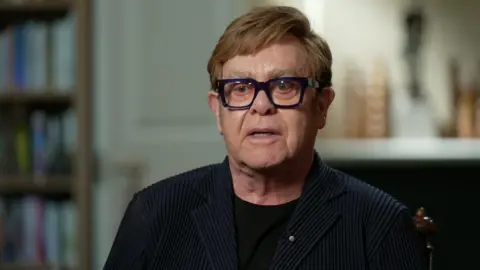Sir Elton John’s recent comments regarding the UK government’s stance on artificial intelligence (AI) and copyright laws have stirred substantial controversy. Speaking in an exclusive interview with Laura Kuenssberg, the esteemed singer and songwriter articulated his strong discontent over new government proposals that would exempt AI companies from paying artists for the use of their work. John, with his characteristic candor, described the government as “absolute losers” and expressed feelings of betrayal at the thought that artists’ rights could be so callously disregarded.
The heart of John’s argument is centered on the implications of allowing AI firms to utilize creative content without compensation. He emphasized that such actions amount to “theft, thievery on a high scale.” This reaction comes on the heels of the UK government’s recent decision to reject amendments proposed by the House of Lords, which sought to impose transparency requirements on AI companies. These amendments would have mandated that these firms disclose the materials they utilize in training their programs, thus protecting the rights of the original creators.
Despite a government spokesperson assuring that no changes to copyright laws would be made without the creators’ interests being fully considered, Elton’s worries resonate with many within the creative community. Generative AI, which forms the crux of this debate, often relies on extensive datasets of existing content—be it text, images, or music—to produce outputs that mimic human creations. John pointed out that young, emerging artists are particularly vulnerable in this landscape, as they often lack the resources to challenge large tech companies effectively. He voiced his concerns, underscoring that these policies could strip the next generation of artists of their income and legacy.
The singer shared his frustration further, stating that the House of Lords had previously voted overwhelmingly in favor of transparency amendments, only to see them rejected by Members of Parliament in the House of Commons. This back-and-forth on the proposed legislation indicates a deepening divide between lawmakers and those reliant on the creative industries for their livelihoods. Elton stated, “The government just looked at it as if to say, ‘Hmm, well the old people … like me can afford it,’” reflecting the disconnection he perceives between policymakers and the younger demographic of artists.
Furthermore, his comments extended an invitation to Prime Minister Sir Keir Starmer to “wise up” regarding the realities faced by creators. John did not hold back in his criticism, labeling the Technology Secretary, Peter Kyle, as “a bit of a moron.” In expressing his outrage, he candidly stated that if government plans do not change, he is prepared to take legal action against ministers, vowing to “fight it all the way.”
Adding to the discourse on the importance of creators’ rights, playwright James Graham, who accompanied John in the interview, also highlighted a disconnect between governmental understanding of the value of creativity and the leniency towards “Silicon Valley tech bros.” Music stakeholders, such as Tom Kiehl, CEO of UK Music, have also voiced concerns that the government may be jeopardizing the music industry’s future in favor of appeasing American tech corporations.
Ahead of contentious votes in the House of Lords, Elton John joined a coalition of over 400 musicians and artists in urging the Prime Minister to revise copyright laws to better safeguard their work against exploitation by artificial intelligence. Other notable figures, including Beatles legend Paul McCartney, have echoed these concerns, asserting the risk of creating a “Wild West” environment for artists’ copyrights.
In the face of these developments, a government spokesperson affirmed their commitment to balancing the interests of both the creative industries and AI companies. They expressed intentions to compile a report and conduct an economic impact assessment to weigh the various considerations involved in the ongoing debate over AI’s role in the creative landscape. John and his contemporaries remain vigilant, pressing for necessary changes to protect their artistry in an age increasingly influenced by digital technology and artificial intelligence.



